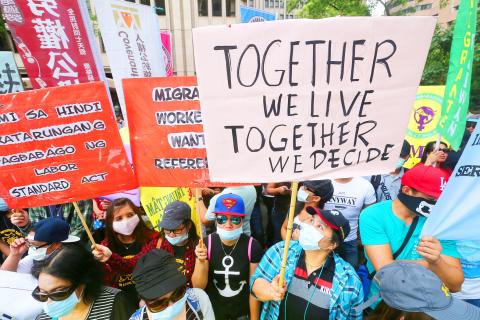A coalition of labor groups and migrant workers’ unions yesterday urged the government to improve the working conditions of migrant workers and allow them to vote on referendums related to labor issues.
About 70 migrant workers and labor rights advocates yesterday held banners and shouted “live together, decide together” in a demonstration in front of the Central Election Commission office on Xuzhou Road in Taipei.
Amendments to the Labor Standards Act (勞動基準法) have greatly affected migrant workers, because they have the toughest work conditions, said Hsu Wei-dong (許惟棟), a member of the Hope Workers’ Center in Hsinchu.

Photo: CNA
“Although the amendments affect them far more than others, the Ministry of Labor has not once communicated with them about the new law or translated the regulations into their languages,” he said.
Local labor groups are promoting two referendum proposals aimed at improving labor rights — one on reinstating seven public holidays that were scrapped last year and another on repealing the labor law amendments that took effect last month — and migrant workers should also be allowed to vote on them, he said.
“We are protesting in front of the Central Election Commission because it will not allow them to vote as they are not citizens,” he said.
“Before the amendments, we would work for six consecutive days at most. Now we have to work for 12 days in a row and only get two days off after that,” said Vietnamese Migrant Workers’ Union representative Nguyen Viet Ca, who has worked in Taiwan for five years.
“Has the government really considered the needs of workers? Or are workers just money printers to them?” he asked.
Migrants who work in their employers’ homes are the most discriminated against, and are overworked and underpaid, said Gilda Banugan, chairwoman of Migrante International’s Taiwan chapter, adding that many of them are also victims of physical abuse, such as sexual harassment and rape.
“We are really sad because we are deprived of justice. Most of our brokers and employers do not comply with what is written in the contracts. No days off, not enough food to eat, no privacy in the place we sleep,” she said, adding that a large chunk of their incomes go to brokers, who extract all kinds of fees from them, often illegally.
The government should abolish the broker system and allow migrant workers to vote to support better policies, she said, adding: “Workers should not be divided based on their nationality.”
The two referendum proposals, organized by a coalition of labor groups, have passed the commission’s initial reviews. They must gather 281,745 signatures by July 31. Union members said they have nearly 40,000 signatures.

‘DENIAL DEFENSE’: The US would increase its military presence with uncrewed ships, and submarines, while boosting defense in the Indo-Pacific, a Pete Hegseth memo said The US is reorienting its military strategy to focus primarily on deterring a potential Chinese invasion of Taiwan, a memo signed by US Secretary of Defense Pete Hegseth showed. The memo also called on Taiwan to increase its defense spending. The document, known as the “Interim National Defense Strategic Guidance,” was distributed this month and detailed the national defense plans of US President Donald Trump’s administration, an article in the Washington Post said on Saturday. It outlines how the US can prepare for a potential war with China and defend itself from threats in the “near abroad,” including Greenland and the Panama

A wild live dugong was found in Taiwan for the first time in 88 years, after it was accidentally caught by a fisher’s net on Tuesday in Yilan County’s Fenniaolin (粉鳥林). This is the first sighting of the species in Taiwan since 1937, having already been considered “extinct” in the country and considered as “vulnerable” by the International Union for Conservation of Nature. A fisher surnamed Chen (陳) went to Fenniaolin to collect the fish in his netting, but instead caught a 3m long, 500kg dugong. The fisher released the animal back into the wild, not realizing it was an endangered species at

The High Prosecutors’ Office yesterday withdrew an appeal against the acquittal of a former bank manager 22 years after his death, marking Taiwan’s first instance of prosecutors rendering posthumous justice to a wrongfully convicted defendant. Chu Ching-en (諸慶恩) — formerly a manager at the Taipei branch of BNP Paribas — was in 1999 accused by Weng Mao-chung (翁茂鍾), then-president of Chia Her Industrial Co, of forging a request for a fixed deposit of US$10 million by I-Hwa Industrial Co, a subsidiary of Chia Her, which was used as collateral. Chu was ruled not guilty in the first trial, but was found guilty

DEADLOCK: As the commission is unable to forum a quorum to review license renewal applications, the channel operators are not at fault and can air past their license date The National Communications Commission (NCC) yesterday said that the Public Television Service (PTS) and 36 other television and radio broadcasters could continue airing, despite the commission’s inability to meet a quorum to review their license renewal applications. The licenses of PTS and the other channels are set to expire between this month and June. The National Communications Commission Organization Act (國家通訊傳播委員會組織法) stipulates that the commission must meet the mandated quorum of four to hold a valid meeting. The seven-member commission currently has only three commissioners. “We have informed the channel operators of the progress we have made in reviewing their license renewal applications, and